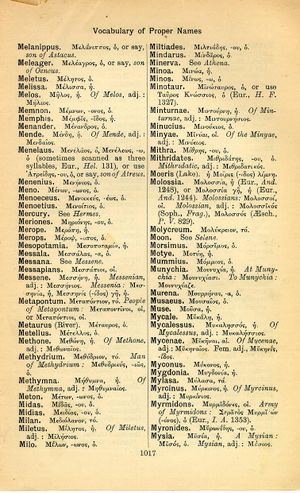Menenius: Difference between revisions
Γυνὴ γὰρ οἴκῳ πῆμα καὶ σωτηρία → Mulier familiae pestis est, mulier salus → Bane and salvation to a house is woman → Die Frau ist nämlich Leid und Rettung für das Haus
m (Text replacement - "link={{" to "link={{") |
m (Text replacement - "}}]]" to "}}]]") |
||
| Line 1: | Line 1: | ||
{{WoodhouseENELnames | {{WoodhouseENELnames | ||
|Text=[[File:woodhouse_1017.jpg|thumb | |Text=[[File:woodhouse_1017.jpg|thumb | ||
|link={{filepath:woodhouse_1017.jpg | |link={{filepath:woodhouse_1017.jpg}}]]Μενήνιος, ὁ. | ||
}} | }} | ||
{{Lewis | {{Lewis | ||
Revision as of 10:11, 15 August 2017
English > Greek (Woodhouse)
Μενήνιος, ὁ.
Latin > English (Lewis & Short)
Mĕnēnĭus:
I name of a Roman gens. Its most celebrated member was Menenius Agrippa, who told the people the fable of the belly and the limbs, Liv. 2, 16, 7; 2, 32, 8; 2, 33, 10.—Another Menenius in the time of Horace, noted as a foolish person, Hor. S. 2, 3, 287.—
II Hence,
A Mĕnēnĭus, a, um, adj., Menenian: tribus, a Roman tribe, Cic. Fam. 13, 9, 2.—
B Mĕnēnĭānus, a, um, adj., of or belonging to Menenius, Menenian: judicium, i. e. of Menenius Agrippa, Liv. 2, 52, 8.
Latin > French (Gaffiot 2016)
Mĕnēnĭus,¹¹ ĭī, m.,
1 nom d’une famille rom. ; nott Ménénius Agrippa [qui apaisa le peuple révolté en lui faisant comprendre l’apologue « les membres et l’estomac »] : Liv. 2, 16, 7 ; 2, 32, 8 || autre du même nom : Hor. S. 2, 3, 287
2 -nĭus, a, um, de Ménénius : Cic. Fam. 13, 9, 2, ou -nĭānus, a, um, Liv. 2, 52, 8.
Latin > German (Georges)
Menēnius, a, um, Name einer röm. gens, aus der am bekanntesten der Konsul Menenius Agrippa, Liv. 2, 16, 7 (wo Agrippa Menenius) u. bes. 2, 32. § 8 u. 33. § 10. – u. ein wunderlicher, halbnärrischer Kauz Menenius zu Horaz' Zeit, Hor. sat. 2, 3, 287. – Adi. menenisch, Menenia tribus, eine röm. Tribus, Cic. ep. 13, 9. 2. – Dav. Menēniānus, a, um, menenianisch, des Menenius (Agrippa), iudicium, Liv. 2, 52, 8.

